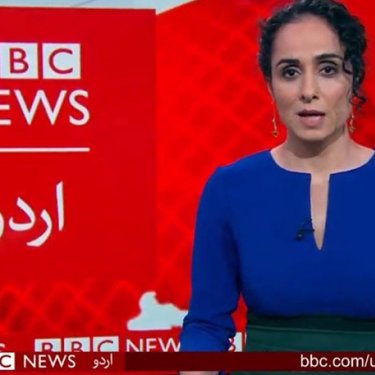Censorship forces BBC to withdraw news show from Pakistani TV

Reporters Without Borders (RSF) regrets that the BBC has had to stop broadcasting a daily Urdu-language news bulletin on Pakistan’s AAJ TV because of constant “inference” by the Pakistani TV channel, under pressure from the authorities. RSF condemns this brazen censorship and calls on Pakistan’s government to stop meddling in media content.
Produced by the BBC’s Urdu Service and broadcast on privately-owned AAJ TV since 2015, the 30-minute daily news programme, called Sairbeen, had been suspended since October. The BBC finally announced on 15 January that it was terminating its contract with the Pakistani TV channel with immediate effect.
“We have experienced interference in our news bulletins since October 2020 and gave AAJ TV ample time to return the programme to air,” BBC World Service director James Angus said, adding that any interference constitutes a “serious breach of trust with our audiences.”
The “interference” cited by the BBC is a euphemism for AAJ TV’s censorship of certain content because of constant pressure from Pakistan’s political and military establishment.
Dictates
Voice of America, which also produces a daily Urdu-language news show for AAJ TV, has also reported “occasional disruptions” by the TV channel and “occasional censorship of content within a show without prior warning.”
“By deciding to terminate its contract with AAJ TV, the BBC has refused to bow to the dictates that the Pakistani authorities impose on the broadcast media,” said Daniel Bastard, the head of RSF’s Asia-Pacific desk. “We call on Prime Minister Imran Khan’s government to stop interfering in the news media’s editorial decisions. Such practices are fundamentally anti-democratic and recall the worst periods of military dictatorship in Pakistan.”
Pakistan’s regulators don’t hesitate to censor TV news channels when their content fails to reflect the views of the civilian or military authorities. In June 2019, TV screens suddenly went blank during a Geo News interview with a former president because TV cable operators disconnected transmission at the military high command’s behest.
Suspension
A few days later, three TV news channels were suddenly suspended from cable networks at the behest of the regulatory authorities in reprisal for broadcasting an opposition leader’s news conference.
For the time being, the BBC’s daily Urdu-language TV news programme can still be viewed online in Pakistan. But a proposal for regulating audiovisual content on the Internet that was published last year (and was the subject of an RSF analysis) poses a grave threat to the future of editorial freedom for online journalistic content.
Pakistan is ranked 145th out of 180 countries in RSF's 2020 World Press Freedom Index.


